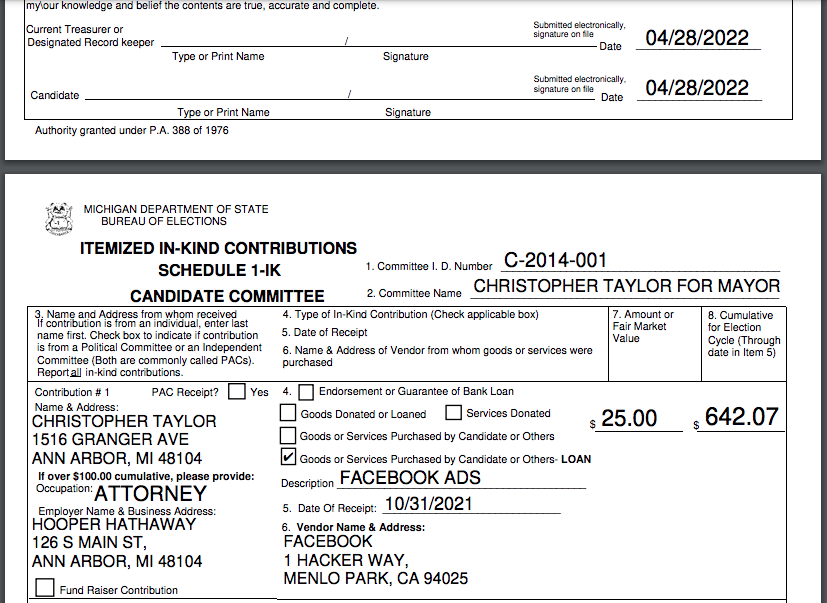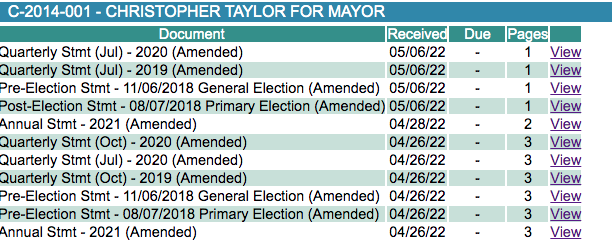County Clerk Asked to Disqualify Ann Arbor’s Mayor From Running for Re-Election
by P.D. Lesko
When filing to run, candidates for elected office sign affidavits swearing their campaign finances are in proper order. Between 2018 and 2020, Ann Arbor Mayor Christopher Taylor purchased multiple Facebook ads, but his campaign Treasurer Joan Lowenstein neglected to disclose the expenditures on Taylor’s campaign finance disclosures filed with the Washtenaw County Clerk. The omissions violated Michigan campaign finance law and may result in fines. In early 2021, an Ann Arbor resident discovered the omissions and filed a campaign finance violation complaint against Taylor with the Michigan Secretary of State’s Elections Division. According to a recent letter from the Michigan Secretary of State, Taylor was made aware of the campaign finance violation by Michigan officials in March 2022. Between April 26, 2022 and May 6, 2022, Taylor and his Treasurer submitted 11 amended campaign finance disclosures. All of Taylor’s 11 amended statements were filed with the County Clerk’s office after the filing deadline to run for office; none of the amended statements are signed. As a result, County Clerk Lawrence Kestenbaum has been asked to disqualify Ann Arbor Mayor Chris Taylor from running for re-election.
Michigan law requires candidates for elected office to have their campaign finances in order before filing to run, not after the filing deadline. Candidates filing for office sign an affidavit in which they swear that “as of the date of the affidavit, all statements, reports, late filing fees, and fines required of the candidate or any candidate committee organized to support the candidate’s election under the Michigan campaign finance act … have been filed or paid.” Election Law also states that “An officer shall not certify … the name of a candidate who executes an affidavit of identity that contains a false statement.”
Among the amended filings submitted by Taylor and his treasurer between April 26-May 6 were multiple disclosures that documented the amounts Taylor had spent on Facebook advertising for candidate campaigns between 2018 and 2020. Taylor’s amended disclosures substantiate the allegations of multiple campaign expenditure omissions made in the campaign finance violation complaint submitted to Michigan officials in March 2021.

The situation strikes Council member Kathy Griswold (D-Ward 4) as ironic. “The only thing I’ll say is that if he [Taylor] is disqualified from running, I think Anne Bannister will be a great mayor. She’s ethical, warm and inclusive. It would be a huge improvement.”
It was 2022 Democratic mayoral candidate Anne Bannister who, in 2018, filed a lawsuit against Taylor for trying to sell the Library Lot land without a proper vote of City Council, a violation of the City’s Charter.
When the suit was filed Taylor reportedly said, “I don’t believe that councilmembers suing the mayor and the city about a political matter is a move in the right direction for the city.”
The lawsuit was subsequently settled in 2019 by then City Attorney Stephen Postema; Taylor’s effort to sell the public land which voters in Nov. of 2018 had earmarked for a park, was stopped.
In 2020, Ann Arbor Mayor Christopher Taylor ran Facebook ads in support of City Council candidates whom he had endorsed. In early 2021, former Ward 1 Council candidate Eric A. Sturgis discovered Taylor’s campaign finance reports for the periods during which the campaign Facebook ads were purchased did not include disclosures of the Facebook ad spending, as is required by Michigan campaign finance law. Sturgis, with the help of Ann Arbor City Council member Elizabeth Nelson (D-Ward 4), submitted a campaign finance violation complaint to the Michigan Secretary of State’s Elections Division. Sturgis provided a copy of the original letter of complaint, including evidence of the Facebook ads, to The Ann Arbor Independent in March 2021.
The original letter of complaint (above) included links to three campaign finance statements that disclose Facebook ad expenditures made by Taylor’s campaign in July of 2018, totaling $1,024.03. The complaint went on to point out that “eight subsequent [campaign finance] statements report zero Facebook ad expenditures for ‘Christopher Taylor for Mayor.'” Those statements were filed by Taylor between October 2018 and January 2021. However, during that time (5/7/18-3/17/21), the complaint stated, “Facebook ad library reports a total of $2,821 in expenditures by ‘Christopher Taylor for Mayor.'” The complaint gave dates between 8/1/18 and 8/18/20 on which Taylor paid for a total of 14 Facebook ads, listing his Christopher Taylor for Mayor as the source of the ads.
Taylor received notification of the missing Facebook ad spending information from Michigan officials prior to the April 19, 2022 filing deadline. Ultimately, however, the accuracy of a candidate’s campaign finance disclosures rests solely with the candidate and her/his treasurer. State and local officials are not required to alert candidates to violations or omissions prior to any particular filing deadlines.

The Washtenaw County Clerk is not alone in being expected to disqualify Michigan candidates for office with campaign finances that were not in order as of the filing deadline. On May 20, 2022, the Wayne County Clerk Cathy Garrett sent a letter to Democratic Rep. Cynthia Johnson informing Rep. Johnson that she was disqualified for running for re-election due to unpaid outstanding campaign finance fees.
In May 2022, the Michigan Secretary of State disqualified fifteen other candidates for office in Michigan from running for office due to a combination of violations of Michigan campaign finance law and Michigan law. Among those disqualified candidates was Democratic state Sen. Betty Jean Alexander of Detroit.
In 2019, Michigan Secretary of State Jocelyn Benson told Michigan lawmakers that dealing with campaign finance violations was among her top priorities.
On May 22, 2022 Sturgis sent a formal request to the County Clerk to disqualify Taylor from running for re-election. Sturgis wrote:
“Mayor Christopher Taylor filed to run for Mayor of Ann Arbor and was certified on April 13th, 2022. There was still this pending campaign finance issue [the Facebook ad spending omissions] yet to be resolved, and then on April 26th, 2022 after the FILING deadline the Christopher Taylor for Mayor Campaign filed an amended CFR [campaign finance report] that addressed some of my complaints, and again on May 6th, 2022. As you are probably aware I believe he had to sign an Affidavit certifying that he had no unresolved campaign finance issues; this was not true….I believe that you need to look into whether candidate Christopher Taylor needs to be removed from the ballot…”
An official from the Michigan Secretary of State Elections Division said, “Candidates who file with county clerks may be disqualified based on affidavit of identity by the county clerk.” In other words, if Mayor Taylor is found to have made a false statement on his affidavit of identity, i.e. that his campaign finances were in order as of the April 19, 2022 filing deadline, Washtenaw County Clerk Lawrence Kestenbaum could be compelled to disqualify Taylor from running for re-election.


Comments are closed, but trackbacks and pingbacks are open.